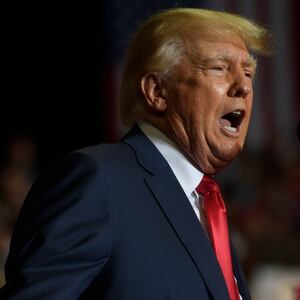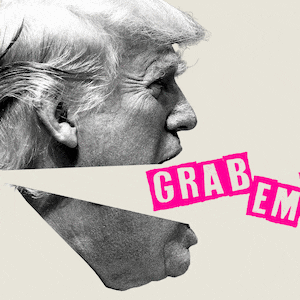Are you on Truth Social? What cable news network do you watch? Have you ever used the hashtag #BelieveAllWomen when discussing sexual assault?
With just weeks to go before E. Jean Carroll’s rape trial against Donald Trump in New York, lawyers on both sides are figuring out what questions to ask prospective jurors. And while some questions are the run-of-the-mill kind used to screen biased jurors, a fair share highlight the bizarre nature of the case involving the country’s most divisive politician.
The federal trial is set to begin April 25 in Lower Manhattan, where the magazine columnist seeks to prove that the former president raped her in a changing room inside the luxury department store Bergdorf Goodman in the 1990s. Due to Trump’s delay games and refusal to test his DNA against the black coat dress she wore that day—which has been tested at a crime lab—jurors will mostly have to decide on competing recollections of what happened that day.
As such, the stakes are high for weeding out MAGA types and Trump haters. And the questions they plan to ask at jury selection indicate as much, half a dozen legal scholars told The Daily Beast.
One of Trump’s proposed questions stands out: “Do you think that the #metoo movement has gone too far?”
“He’s trying to poison the well a little bit and plant seeds in the jurors' minds. He’s warming them up before he even talks to them,” noted Aviva Orenstein, a law school professor at Indiana University Bloomington.
However, Orenstein noted that unlike New York state courts, judges in federal court normally screen jurors with lawyers’ suggested questions—and no self-respecting judge would ask a leading question like that.
“I’d ask, ‘What is your opinion of #metoo?’” she said.
Both sides’ proposed lists include several questions on a person’s feelings about alleged sexual assault, and scoring open-minded jurors who haven’t already labeled Trump a scumbag will be difficult. At trial, Carroll’s lawyers are hoping to convince jurors that Trump’s abundant history of misogynist comments paint the picture of a serial sexual predator protected by his entitlement and wealth.
In that sense, U.S. District Judge Lewis Kaplan has already tilted the trial in Carroll’s favor by allowing jurors—if they somehow haven’t already—to watch the leaked 2005 Access Hollywood tape where Trump infamously said, “When you’re a star, they let you do it… you can do anything… grab 'em by the pussy.”
Trump’s lawyers also want to engage in what several legal scholars noted was a blatant litmus test for people’s politics: dredging up the debacle that was the Senate’s contentious confirmation of Trump’s Supreme Court pick in 2018, Brett Kavanaugh. After he underwent a surface-level FBI background check, it was journalists who documented Kavanaugh’s long history of alleged sexual misconduct—including one episode in high school, where a prep school student recalled him drunkenly pinning her down in a bed while covering up her mouth so she couldn’t scream.
At Carroll’s trial later this month, Trump’s lawyers want to ask: “Are you familiar with the allegations made against Supreme Court Justice Brett Kavanaugh before he was confirmed to the Court?”
Attorneys trying to assess people’s biases regularly draw from examples in movies and widely followed news stories—but this one carries a particular undertone that smacks of a MAGA loyalty test, noted Andrea D. Lyon, a longtime public defender who’s tried 138 cases in court.
“These are the kinds of questions you can’t get to ask. Judges won’t let you, because you’re bringing in a case that has nothing to do with a trial… there’s a huge backstory. And my guess is, it’s to identify people who just hate Trump, and also take a look and see if ‘grab ‘em by the pussy’ people stick together,” said Lyon, a law professor at Indiana’s Valparaiso University.
There is something that attorneys for both Trump and Carroll are itching to know: where these New Yorkers hang out online. Carroll’s team is keen to identify anyone who joined Trump when he got booted off Twitter and launched his own social media network—a relatively small batch that was estimated at 513,000 active daily users last year.
“Is there anyone who uses or has used the social media platform Truth Social?” Carroll’s lawyers have proposed asking.
“Most of them probably don’t know what Truth Social is. Obviously, if they use it, it tells you a lot about who they are. It's Trump's platform,” noted Bennett L. Gershman, a law professor at Pace University in New York City.
Meanwhile, Trump’s team wants prospective jurors to list every social platform they’re on. But they stopped short of asking for potential candidates’ usernames, which could be seen as an offensive intrusion of privacy.
Carroll’s lawyers seem intent on using the jury selection process to point out how Trump is also under criminal investigation, with proposed questions probing people’s familiarity with the Manhattan District Attorney’s criminal case against him for faking business records to hide his hush money payment to porn star Stormy Daniels and the Justice Department’s investigation into his hoarding of classified documents at his Florida oceanside estate of Mar-a-Lago.
Just this week, Trump lawyer Joe Tacopina cited that first case and the widespread press coverage of Trump’s criminal arraignment in Manhattan criminal court as a reason to delay the trial—something that Carroll’s lawyer, Roberta Kaplan, starkly resisted in a letter to the judge on Wednesday.
Carroll’s lawyers are trying to screen the crazies who still parrot Trump’s unfounded claims that he lost the 2020 election to President Joe Biden unfairly.
“Is there anyone who believes the results of the 2020 Presidential Election are illegitimate?” her lawyers hope to ask.
Gershman doubts that the federal judge will allow it, though.
“This one is unique to our time. We haven’t had a presidential election where there are elements about whether the results are legitimate or not. But this is a question that the judge might not allow, because it’s getting into politics… and partisan politics has nothing to do with this trial,” he said.
But he stressed that it’s a question worth asking—along with a person’s views about alleged sexual assault.
“I’d like to know how they feel about those kinds of issues that are prevalent today to get a sense of whether I’m dealing with someone who’s intelligent and somewhat progressive or in the Dark Ages,” Gershman said.







